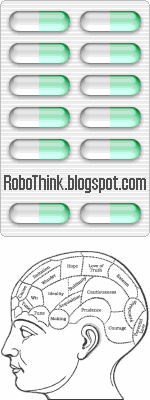The Un-Emotional Brain
 There's a review of the much praised book by Joseph LeDoux, "The Emotional Brain", in the June 1997 issue of Scientific American magazine. The review is by Antonio Damasio (Professor of Neuroscience at the University of Southern California). If you have a subscription at the SciAm.com website it's available online. After much praise for the material that LeDoux presents, Professor Damasio says:
There's a review of the much praised book by Joseph LeDoux, "The Emotional Brain", in the June 1997 issue of Scientific American magazine. The review is by Antonio Damasio (Professor of Neuroscience at the University of Southern California). If you have a subscription at the SciAm.com website it's available online. After much praise for the material that LeDoux presents, Professor Damasio says:"I do not wish to disappoint readers bored by so much agreement between reviewer and author, so I will say I do not endorse LeDoux's general attitude toward feelings."Joseph LeDoux expresses a number of misgivings about the extent to which emotions and feelings can yield to objective scientific investigation. Damasio says "His fear of feelings is really twofold" and points out that present day neuroscience has both the tools and the techniques to study emotions and feelings in animals and humans. The first chapter of LeDoux's book is titled "What's Love Got to Do with It?". I'll quote EVERYTHING Joseph LeDoux has to say about love in that chapter.
"From the point of view of the lover, the only thing important about love is the feeling. But from the point of view of trying to understand what a feeling is, why it occurs, where it comes from, and why some people give and receive it more easily than others, love, the feeling, may not have much to do with it at all."That's it. Apart from merely including the word 'love' as part of a listing -- "love and hate and fear and anger and joy" -- LeDoux has nothing to say about the characteristics of love as a feeling. Even worse, the book has no answers to the questions posed in the quote. The word "love" isn't even in the index. In the book, Joseph LeDoux states quite openly that "fear" is the only emotion he has investigated. I can just imagine a telephone conversation that might have taken place after LeDoux's literary agent finished reading the manuscript:
Agent: "Hi Joe. Your manuscript is a great piece of work. Just one small point, I think we'll have to change the title. Calling it The Fearful Brain may discourage people from buying it."
LeDoux: "But that's the only emotion I've studied."
Agent: "Well maybe, but I think it would sell like hot cakes if you renamed it The Emotional Brain."
LeDoux: "I don't know squat about other emotions."
Agent: "Never mind. Most people judge a book by the cover and inside they'll find fascinating research. Let's run with it."
On January 4, 2005, there was an article in the New York Times with the title "God (or Not), Physics and, of Course, Love: Scientists Take a Leap," reporting the annual tradition of asking scientists a deep philosophical question posed by Edge.org. The question this year was "What do you believe is true even though you can't prove it?" Joseph LeDoux said:
"For me, this is an easy question. I believe that animals have feelings and other states of consciousness, but neither I nor anyone else has been able to prove it. We can't even prove that other people are conscious, much less other animals."There's an interview with Joseph LeDoux (and a photo) on the Edge.org website. On the 2nd page LeDoux says:
"the capacity to be afraid of falling in love is something that requires the cognitive integration of the system for finding mates and the system for defending against predators. While I'm sympathetic towards the basic emotions view, I don't really ascribe to it. It requires that you state what the different emotions are. That just leads to arguments. I'd rather spend my time worrying about one well accepted emotion and its organization in the brain than fighting over whether this or that mental process is an emotion or not."In other words, he has nothing of practical value to say about building a loving relationship. In another interview he said:
"I'm often asked why do I study fear instead of love or joy or something nice. The answer is that life is short. You can do one thing in detail or you can do a lot of things superficially."Fortunately, not all neuroscientists are as narrowly focused and unemotional as Joseph LeDoux. See: A General Theory of Love.
Joseph LeDoux's next book, "Synaptic Self", received a somewhat mixed review in New Scientist magazine:
"When so many authors concentrate entirely on cognition, it is refreshing to have the balance redressed - even if much of the research reported is on fear in rats, and the section on human love is based on pair-bonding in prairie voles."
- Related blog article:
Empathy Deficit

2 Comments:
Be fair to Joseph LeDoux. According to the senior editor of Scientific American, John Horgan, in "The Undiscovered Mind", LeDoux was surprised how enthusiastically psychiatrists responded to his book. He said all he suggested was that investigations of the neurobiology of fear might *at some point* yield better treatments for anxiety disorders ... QUOTE: "It's been almost this uncritical acceptance," he explained. "'Yes, let's go! This is the answer!' They seem so desperate. I don't think I have the answers in my book. I just threw out some ideas."
Yes, it's not LeDoux's fault if readers overestimated the scope of his material. I was making the point that the title of the book was a bit grandiose. I think a more appropriate title would have been "Fear pathways in the brain".
<< Home